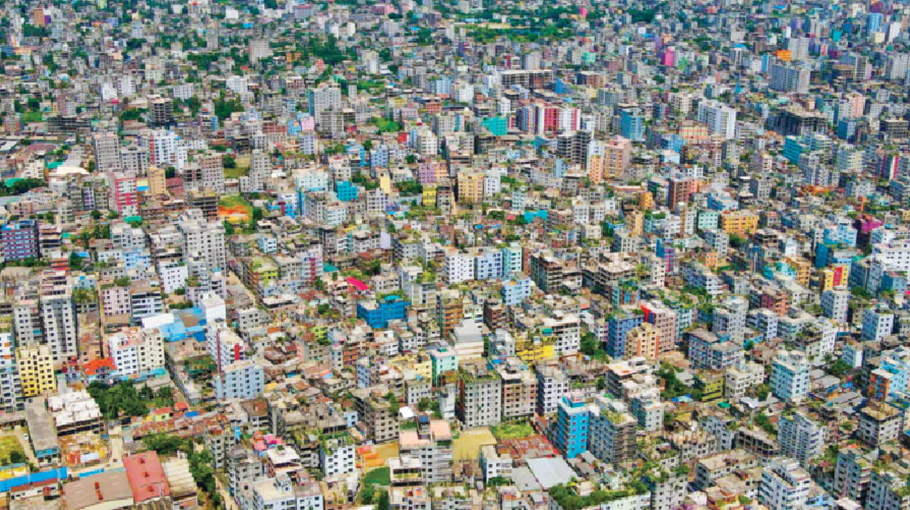Unplanned urbanisation in Dhaka city fuels ecological degradation

Urbanisation is closely related to the development and modernisation process of a country. During this process, a large number of people become permanently gathered to live in relatively small areas, people from rural areas migrate to urban areas, forming cities. Though it has a good number of social and economic importance, the process creates serious problems to the sustainability of the environment.
It was reported that Bangladesh is a rapidly urbanising country expected to host 56 percent of its population living in urban areas by 2050. After independence, the country's urbanisation status was 7-8 percent, which has reached 35 percent today. Planned urbanisation has beneficial impacts on the living standard of city dwellers. It creates higher economic growth, provides better living qualities, better educational facilities, better healthcare facilities, more recreational facilities, better transportation facilities, etc.
Moreover, it helps to build better communication networks, develop suitable sewage systems, facilitate fresh water, and generate better electric systems for the city, and so on. On the other hand, unplanned urbanisation is causing environmental and natural disasters in all the cities or urban areas of the country. In addition to environmental issues, it was reported that rapid and often unplanned urbanisation can bring many risks including increased threats to infrastructure, social instability, spreading life threatening disease, shortages of fresh water and other vital resources.
Dhaka is one of the fastest growing cities, its population is increasing day by day, and is rapidly extending both horizontally and vertically. Due to the lack of proper planning and environmentally friendly procedures, this growth of this city became seriously harmful for the quality of the land, air, and water. Social insecurity, natural and human-made hazards, lack of equitability of resources, poor urban governance, and poor infrastructural facilities are common scenarios in Dhaka city.
Due to uncontrolled urbanisation in Dhaka city, environmental degradation has been occurring very rapidly. City people are suffering from various diseases frequently due to the presence of dust particles in the air, and black smoke from unfit vehicles and factories. Uncontrolled urbanisation has created overcrowding, traffic congestion, cultivable land reduction, increased air water and sound pollution, poor waste management, water stagnation or flooding, water quality deterioration, and destruction of ecosystems.
Rapid urban growth and human activities have increased energy consumption, decreased level of oxygen, elevated the level of greenhouse gas like carbon dioxide (CO2), carbon monoxide (CO), ozone (O3), sulfur oxides SO2, and many other pollutants, and made the effect of climate change enormous. The overall situation is creating an urban heat island (UHI) in Dhaka city in which the city has become significantly hotter than the surrounding areas.
Researchers in this field said that in the last 20 years, the temperature of Dhaka has increased by 3˚C. Heat in the urban areas is increasing due to the presence of more concrete buildings, presence of a lot of unplanned buildings, asphalt, and other surfaces that absorb heat, reduction of green area in city areas, lack of trees, parks or vegetation. We have observed that, recently, deforestation has increased in the urban area to a great extent. It was reported that cities are a key contributor to climate change, as urban activities are major sources of greenhouse gas emissions, and cities are responsible for 75 percent of global CO2 emissions.
Environmental degradation is considered as a major problem of Dhaka city, and we are in need of a sustainable, environment-friendly, economically viable, and socially peaceful city. Therefore, we will have to focus on green technology that can change the negative impact of the environment.
We can think about environmentally-friendly vehicles, products, machines and utilities to maintain a green environment and green economy. To control migration of people from rural areas to city areas, emphasis should be given on the decentralisation process. More investment and good policy is required in the other cities or towns of the country to bring the migrants there instead of entering into Dhaka city.
As the amount of greenhouse gases in the atmosphere of urban areas increases, it is accelerating global warming and climate change. Climate smart, sustainable urban development planning is necessary today. Water bodies, trees, forests, and green space preservation should be emphasised during urban planning. More investment is essential to make green roofs, enrich parks with more trees, plant more trees around the residence, playgrounds, school premises or buildings and other open places.
For sustainable and resilient urban development, government agencies, NGOs, private sectors, and citizens will have to come forward together. Investment should be given on renewable energy sources such as solar, wind and water to reduce dependence on fossil fuels.
It is necessary to remove unfit and unauthorised vehicles from the road. River, canal and lakes should be maintained intact. Inspire walking, cycling and use electric and paddle driven rikshaw for travelling to short distance areas. Efficiency of the city waste collection and recycling program should be enhanced. Improve wastewater treatment facilities to prevent soil and water contamination. Improve drainage system, remove illegal constructions near the canal, river or water bodies. Find an alternative source of using polythene bags or products. In the meantime, the Ministry of Environment, Forest and Climate Change has taken initiative to stop manufacture and use of polythene bags in the country.
Dr Mohammad Humayun Kabir, a Professor in the Dept of Horticulture at Sher-e-Bangla Agricultural University




